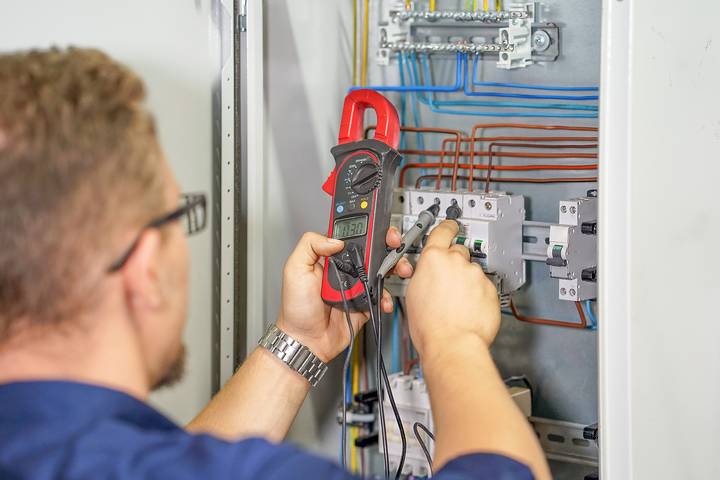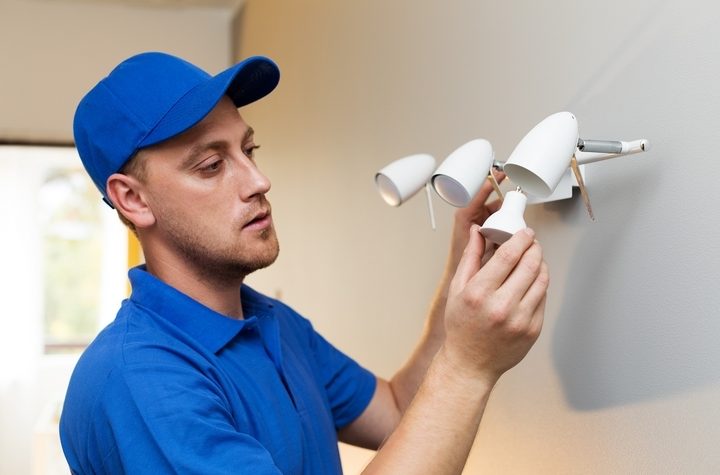Being an electrician is not for everyone. To perform their duties, electricians are often required to climb up and down scaffolding, bend down, squat, and work in tight spaces. They get to use hand and power tools and must equip themselves with specialized safety gear.
But what exactly are the duties of an electrician? Let’s take a deep dive into the day in the life of an electrician:
Duty #1: Common job duties of an electrician

Some of the most common home electrician job duties revolve around the installation, maintenance and repair of electrical components and systems. Electricians get to work both in residential and commercial settings.
Here are some of the tasks they can perform:
- Installing, maintaining and repairing electrical systems and components in buildings and other structures. This includes wiring, light fixtures, fuses, circuit breaker panels, and more.
- Planning and designing the layouts of fixtures and other electrical elements inside residential and commercial buildings.
- Testing and inspecting electrical work such as wiring and lighting ensures proper functioning, safety, and compliance.
- Reading blueprints and diagrams to diagnose electrical issues and repair them.
- Calibrating electrical equipment to meet specifications.
Other tasks include:
- Assembling, installing, testing, and repairing electrical appliances.
- Measuring, cutting, bending, threading and installing wiring and electrical cable systems.
- Performing regular preventative maintenance on electrical systems and components.
- Identifying and resolving electrical issues, safety hazards, and regulatory code violations.
Duty #2: Team projects and tasks

Although electricians work alone, they sometimes work as a team on large, commercial or industrial projects. They can also collaborate with other trade professionals on large-scale projects such as construction sites.
Here are examples of tasks and duties electricians can perform as part of a team:
- Designing and developing diagrams, plans or blueprints for projects that involve new electrical installations.
- Designing wiring plans based on construction floor plans provided by a contractor.
- Planning electrical installation projects with electrical engineers and trade professionals.
- Collaborating with general contractors and other construction professionals on a construction project.
- Communicating with code enforcement agencies during inspections and evaluations of electrical systems and components.
Duty #3: Specialized electrician job duties

Electrician job duties can include specialized tasks in different industries depending on their chosen career path.
Specialized electrician job duties can be as diverse as:
- Installing, maintaining and repairing signal lights, parking lot lights, and building-mounted signs.
- Installing, repairing or upgrading electrical equipment on highways, including street lights, traffic management systems, and signage.
- Maintaining electrical equipment on oil rigs or offshore oil platforms.
- Maintaining electrical systems and wiring on ships, boats, and yachts.
They may also be skilled in:
- Inspecting, repairing and replacing electrical systems in automobiles and other vehicles.
- Installing, maintaining and repairing solar panels, grids, and wiring.
- Installing and repairing electrical control panels for lighting, HVAC, and refrigeration systems.
- Maintaining and repairing large-scale refrigeration, air conditioning, and heating units.
Duty #4: Administrative tasks and office duties

Although electricians don’t spend most of their time working in an office space, they can have some administrative tasks and office duties to perform. This is especially true for electricians who choose to be self-employed or to work as independent contractors.
The administrative duties of an electrician can include:
- Assigning tasks to apprentice electricians and organizing workflow.
- Recruiting and training apprentice electricians and helpers.
- Organizing and maintaining electrical blueprints and diagrams.
- Scheduling maintenance and installation appointments.
- Filling out paperwork to document residential and commercial projects.
In addition, their other responsibilities include:
- Documenting transactions with customers and clients.
- Organizing a budget and managing project funds and resources.
- Communicating with customers, suppliers, vendors and contractors to coordinate electrical work and acquire supplies.
- Marketing their services and building a network if they are self-employed.
Duty #5: Customer service tasks

Finally, the job duties of an electrician can often be about communicating with residential or commercial clients. They need to be able to discuss their services and progress on a job and ensure they meet their client’s expectations on each project.
Their tasks related to customer service can include:
- Communicating with property owners to discuss project details and updates.
- Being available to address customer questions and concerns over the phone.
- Answering emergency repair calls and discussing repair work as well as fees.
- Describing products and services to potential customers.
- Establishing and maintaining good business relationships with customers, clients, and collaborators.
As you can see, there is more to being an electrician than repairing light fixtures or maintaining electrical cables. Electricians get to work on various projects, either residential or commercial, and they can either choose to work on their own or as part of a team. They can expect to do something different daily, perform tasks that will help them stay fit, and meet with clients and other trade professionals.




